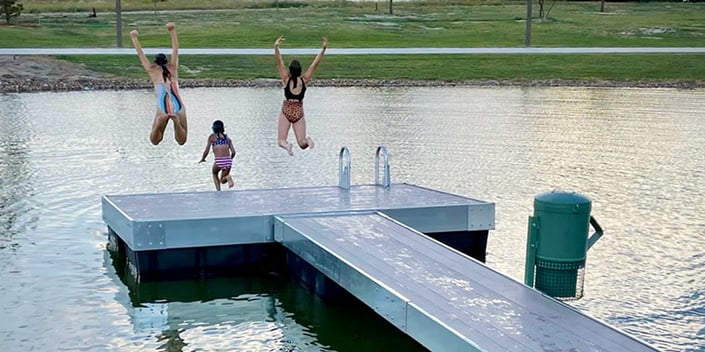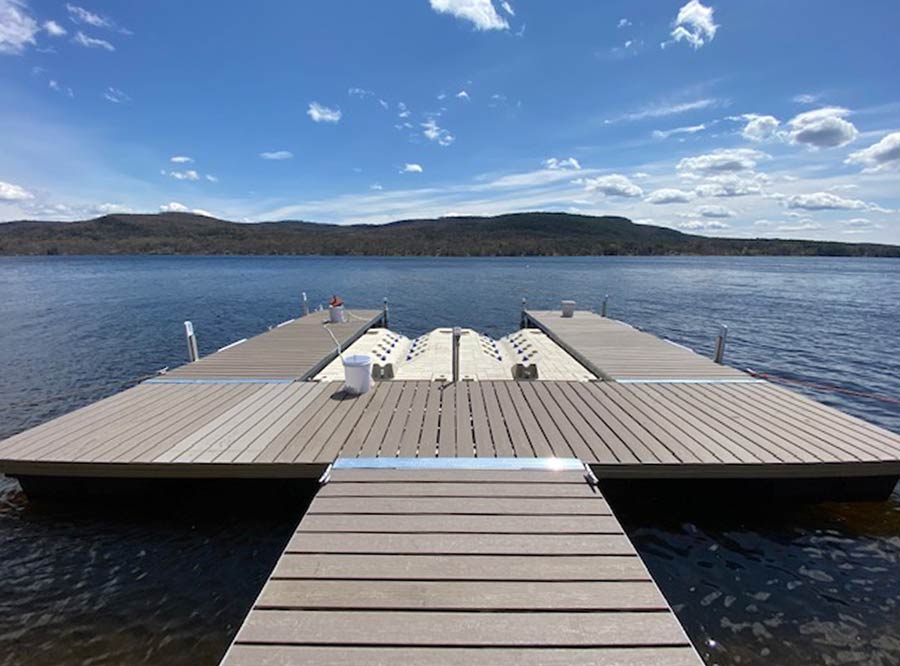Floating Docks: The Smart Selection for Modern Waterside Living and Recreation
Floating Docks: The Smart Selection for Modern Waterside Living and Recreation
Blog Article
Floating Docks: The Ideal Choice for Versatile Water Gain Access To
Floating docks present an engaging option for a range of water gain access to needs, offering versatility that goes beyond typical mooring alternatives. The modular nature of floating docks promotes personalization, catering to certain needs.
Advantages of Floating Docks
Floating docks deal countless advantages that boost water accessibility for various applications. Their ability to fall and increase with transforming water levels makes them specifically useful in environments with changing trends or seasonal variants. This flexibility makes certain that vessels can quickly tie without issue for the water's deepness, giving a reputable system for entertainment, commercial, and industrial uses.
Additionally, floating docks are usually built from durable materials that resist corrosion, making them suitable for long-term usage in aquatic settings. Their setup is commonly less invasive than typical set docks, decreasing the environmental impact and helping with quicker deployment (floating dock services). This adaptability enables less complicated relocation or reconfiguration according to customer needs or ecological modifications
Safety is one more essential benefit; floating docks can offer secure access for people boarding or disembarking from watercrafts and minimize the threat of accidents associated with unstable surface areas. Moreover, they can be designed to accommodate a selection of accessories, such as fenders and cleats, improving capability. Generally, floating docks represent an efficient option for improving water gain access to across varied sectors while advertising security and ecological sustainability.

Sorts Of Floating Docks
Different types of floating docks satisfy different needs and settings, each designed with details functions to optimize functionality. One of the most typical types consist of modular docks, which contain interlocking areas that permit simple modification and expansion. These docks are ideal for entertainment usage, as they can be tailored to fit various watercraft sizes and water conditions.
An additional preferred choice is the fixed floating dock, which continues to be secured in position however drifts with changing water degrees. floating dock services. This kind is especially fit for areas with marginal tidal fluctuations, offering steady accessibility for fishing or swimming. Furthermore, there are drive-on docks, which feature a sloped style that permits watercrafts to easily drive on and off, making them ideal for personal watercraft and smaller vessels
For commercial applications, sturdy floating docks are available, created from strengthened materials to withstand considerable tons and severe aquatic atmospheres. Finally, environment-friendly floating docks utilize sustainable products and designs to decrease environmental influence, usually including functions like vegetation to sustain neighborhood wildlife. Comprehending the different types of floating docks ensures that users can select one of the most appropriate solution for their details requirements.
Installation Process Summary
A successful installation of floating docks needs mindful preparation and focus to information to guarantee ideal performance and safety and security. The initial action involves examining the site conditions, consisting of water depth, present, and possible barriers. This assessment informs the option of the appropriate dock products and layout customized to the details atmosphere.
Following, getting required authorizations is critical, as many jurisdictions have regulations relating to construction on water bodies. The installment can proceed once consents are safeguarded. Begin by preparing the foundation, which may include anchoring systems or pilings customized to the dock type and neighborhood problems.
Adhering to the foundation configuration, construct the dock sections according to producer specs. Make sure that all components are firmly fastened and aligned to stand up to ecological stresses. Placement the dock in the designated location, guaranteeing it is level and steady.

Upkeep Tips and Finest Practices
After the setup procedure is complete, recurring maintenance plays a crucial role in making certain the longevity and performance of floating docks. Regular inspections ought to be carried out to identify any kind of indicators of degeneration, damages, or wear - floating dock services. Look for any kind of loosened installations, splits, or splitting up in the dock areas, as these can endanger structural stability
Cleaning up the dock is important to get rid of debris, algae, and various other accumulation that can impact its appearance and safety and security. Use a mild pressure laundry periodically to my website maintain cleanliness without causing damage to the surface. Furthermore, applying a safety sealer every couple of years can assist enhance longevity and stand up to ecological wear.
Take notice of the mooring lines and anchors, ensuring they are safe and cost-free from deterioration. Replace any degraded elements immediately to stay clear of hazards. Seasonal changes may likewise be necessary; throughout extreme weather conditions, strengthening the dock or rearranging can prevent damages.
Applications for Floating Docks
Floating docks offer a wide range of applications, accommodating both commercial and leisure demands. In leisure settings, they give seamless accessibility to rivers for tasks such as boating, fishing, and swimming. Their adjustable nature enables installment in differing water degrees, ensuring secure and steady accessibility despite tidal changes.
Commercially, floating docks are important for marinas and beachfront services. They promote the docking of vessels, making it possible for efficient loading and discharging of products. Their modular style permits simple expansion or reconfiguration to suit transforming service demands, making them ideal for watercraft leasings, scenic tour operations, or angling charters.
In addition, floating docks are used in environmental applications such as aquatic research and environment reconstruction. They can function as platforms for scientific studies, checking water high quality, or carrying out wild animals surveys without disturbing delicate communities.
In industrial contexts, floating docks are used in building and construction projects, providing accessibility to hard-to-reach locations for equipment and personnel. Their adaptability, resilience, and minimal effect on the environment make them an optimum choice for a large range of applications, improving both performance and ease of access in numerous water-based settings.
Final Thought
In verdict, floating docks represent an optimal solution for diverse water access needs, owing to their flexibility, durability, and modular layout. These frameworks facilitate safe mooring for numerous applications while decreasing ecological impact throughout installation. The lowered upkeep needs further enhance their usefulness. Therefore, floating docks work as a useful property for recreational, commercial, and environmental jobs, making certain reliable access to rivers and promoting sustainable practices in water atmospheres.
Floating docks existing a compelling service for a variety of water access requires, supplying versatility that goes beyond traditional mooring alternatives.Floating docks offer various benefits that improve water accessibility for different applications. On the whole, floating find docks represent an effective remedy for enhancing water access throughout varied markets while promoting safety and ecological sustainability.
Another prominent option is the stationary floating dock, which continues to be secured in location however drifts with changing water degrees.In verdict, floating docks represent an optimal remedy for varied water gain access to needs, owing to their try this website versatility, durability, and modular design.
Report this page